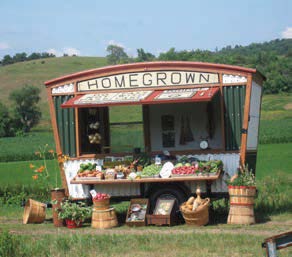Think about it this way: if you buy a $4 coffee every workday, that’s approximately $1000 a year spent on coffee. If you make $10 an hour, that equates to 100 hours of work just to buy coffee. Voluntary Simplicity is about making conscious choices.
In 1995, my husband Jon and I signed up to take the Northwest Earth Institute’s discussion course, Voluntary Simplicity. When you read “Voluntary Simplicity”, what comes to mind? For me, it was “Oh no! I’ll have to get rid of all my things!”
Of course that wasn’t true. We learned through the readings and discussion that Voluntary Simplicity is a lens through which one can examine how the consumer culture society we live in interferes with caring for the natural world that sustains us by encouraging us to keep wanting more and more. But the more we consume, the more we use up those natural resources. We learned that all of our decisions have an impact on everything around us. Seeing this bigger picture helps one have the willpower to forego impulsive throwaway purchases, and to invest in fewer, longer-lasting goods. It is important to note that the VOLUNTARY part of Voluntary Simplicity emphasizes that some of us have the luxury of choice in the practice of simplifying, as opposed to people who have no choice because they live in poverty.
In our modern-day society, people often seek to buy happiness, but find that materialism fails to satisfy. We keep buying stuff, but somehow it isn’t truly making us happy in the long term. According to Annie Leonard in The Story of Stuff, peak happiness was reached in the Fifties, just at the same time that “consumption mania” was being introduced. (If you haven’t seen The Story of Stuff video on YouTube, I enthusiastically recommend it).
We had an “aha” realization when we looked at what we really need. For us it’s the basics like food, clothing, shelter, but not so much stuff that we have to spend all our life-energy scrambling for it. We learned that we don’t need to work so hard if we don’t have to have all the latest gadgets, cars, clothing, etc. We downsized from four cars to one because we didn’t want to pay for insurance, maintenance and gas; we’re also lucky to live close to our workplaces. I am fortunate to work twenty hours a week which gives me the time to cook from scratch most of the time (which I think keeps us healthier), to have time to do my own house-keeping and gardening and not be exhausted. That would all be different if I had to work full-time to pay for more stuff, and pay people to do that work for me.
Don’t get me wrong. This does not mean that one has to live like an ascetic. Our house looks pretty much like everyone else’s. We just spend our money carefully in order to live more simply. Think about it this way: if you buy a $4 coffee every workday, that’s approximately $1000 a year spent on coffee. If you make $10 an hour, that equates to 100 hours of work just to buy coffee (not counting taxes). Voluntary Simplicity is about making conscious choices.
Because of our simple lifestyle, we really didn’t feel the impacts of the recession, even though my husband’s income was reduced by about 30% because he is paid strictly by commission. Perhaps the very best lesson we’ve learned is appreciation and gratitude for the things we do have, and for the time we spend with friends and family, and knowing that we are actively living in alignment with Nature. Living simply is much like living the way people used to live – more collaboratively and interdependently, helping each other and sharing resources.
I can honestly say that I feel such a sense of freedom by not having the need to be part of the constant rush after more, and more, and more. It is freeing to pull back and realize life is about more than having things.
Trent Hamm of The Simple Dollar puts it this way:
Clearly, there are huge financial benefits to voluntary simplicity, but the drawbacks are significant as well. To me, the choice hinges on your personal values more than the financial benefits. Are the financial benefit and the lifestyle freedom enough to outweigh the work and the other material and social losses? Close your eyes, and imagine what you would do if money didn’t matter – what would you be doing? If it’s something that doesn’t cost much money, voluntary simplicity may be a very prudent financial and personal choice for you.
Some books to consider:
- Simple Prosperity by David Wann;
- Better Off: Flipping the Switch on Technology by Eric Brende;
- Voluntary Simplicity by Duane Elgin;
- Your Money or Your Life by Joe Dominguez and Vicki Robin
Master Recycler and waste reduction advocate Betty Shelley, and her husband, Jon, have filled only one 35-gallon can of garbage per year since 2006. They find waste reduction to be a creative way to lessen their impact on the Earth’s resources and a great way to save their own resources. In her three-session class, “Less is More: Getting to One Can of Garbage a Year”, Betty Shelley teaches her techniques for reducing waste and why that’s so important.






